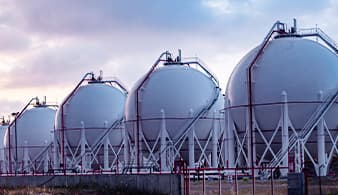Latest insights
Our team of 600+ commodity market experts keep you up-to-date on the energy and commodity markets as they evolve. Explore our latest complimentary written, audio and video content.
Colombia must rush to hit climate mark: OECD
Colombia must rush to hit climate mark: OECD
Bogota, 6 February (Argus) — Colombia will need to speed expansion of mostly non-hydropower renewable energy such as solar and wind power to achieve deeper emissions cuts and meet climate targets, the OECD said in an environmental performance review. Colombia, a member of OEDC, has relatively low greenhouse gas (GHG) emissions, at 3.7 t/capita compared with the OECD average of 10.7 t/capita. It has taken some steps towards mitigation policies, but reaching its ambitious targets will require further actions, the review found. GHG emissions grew at an average rate of 1.7pc/yr from 2005-2020. Achieving Colombia's target of a 51pc reduction in net GHG emissions will require average reductions of 5.4pc/yr, the review said. Colombia pledged to cut emissions by 51pc by 2030 compared with a business-as-usual scenario — up from a previous 20pc target set in 2015 — and to reach net-zero emissions by 2050. It accounted for 0.43pc of global GHG emissions in 2021, according to the most recent data. In September, Colombia reaffirmed the 2030 target of not exceeding 169mn t CO2 equivalent (tCO2e) in 2030, and set a new target to limit GHG emissions to 155mn-161mn tCO2e in 2035. Despite recent progress, the mitigation policies, actions and measures outlined in Colombia's nationally determined contributions — a global pledge of emissions reductions — remain insufficient to achieve net-zero emissions, the OECD said. Energy transition challenges Colombia continues to rely heavily on fossil fuels, despite having a relatively high share of renewables in its total energy supply, largely because of hydropower. Colombia ended 2025 with 21,028MW in installed power generation capacity, of which 63pc — 13,209MW — was hydropower, according to data from electricity market operator XM. Meanwhile, renewable capacity other than large hydropower reached 2,685MW in 2025, including projects in commercial operation and testing, following the commissioning of 27 new plants totaling 925MW, renewable energy association director Alexandra Hernandez said. Despite recent additions, Colombia will likely miss its target of reaching 6,000MW of renewable capacity by August and 50pc of supply by 2050, as pledged by President Gustavo Petro, Hernandez said. Investment trends remain misaligned with climate goals. Colombia attracted an average of $2.3bn/yr in clean energy investment from 2020-2023, while investment in unabated fossil fuels averaged about $6bn/yr over the same period, the OECD said. Clean energy investment accounted for just 4pc of total gross fixed capital formation in Colombia from 2020–2023, compared with a global average of 7pc. High financing costs remain a major barrier, at 13pc-14pc/yr, said Alejandro Castaneda, president of thermoelectric generators association Andeg. In addition, a 2022 tax reform also increased levies on electricity sales from renewable sources to 6pc from 1pc, aligning them with taxes on fossil fuel-fired generation. Separately, the government has expanded renewable capacity through distributed generation in more remote zones, but additional financing and new business models are needed to reduce costs, the OECD said. Other structural barriers persist. Most emissions are either not priced, priced too low or subsidized. Colombia's carbon tax, introduced at Ps15,000 ($5)/tCO2e, initially applied to fuels such as gasoline, diesel and jet fuel, as well as some industrial uses of natural gas and LPG. In 2025, the tax was extended to coal-fired power generators and coal-burning industries, rising to Ps27,399.14/tCO2e. Even so, the tax remains well below estimated climate-related costs and below carbon pricing levels in comparable economies, the OECD said. The system is also among the few globally that allows companies to use carbon offsets to meet tax obligations. The OECD further highlighted policy misalignment, noting that the updated National Energy Plan 2022–2052, which aims to expand solar and wind capacity, is not fully aligned with the emissions-reduction pathways required to meet Colombia's climate targets. "While the government has progressively increased targets for renewable energy, they lack consistency across policy documents," it concluded. By Diana Delgado Colombia electricity production % Send comments and request more information at feedback@argusmedia.com Copyright © 2026. Argus Media group . All rights reserved.
US adds pressure on Iran after talks resume: Update
US adds pressure on Iran after talks resume: Update
Recasts, updates with secondary tariff on Iran oil. Washington, 6 February (Argus) — President Donald Trump's administration on Friday announced actions aimed to add economic pressure on Iran after another round of US-Iran nuclear talks concluded in Oman without much progress. An executive order by Trump, released by the White House Friday afternoon, pledges to impose additional tariffs on US imports from countries engaged in business with Iran. The penalty is not automatic and is not set at a specific amount — it could be "for example 25pc", the order states. The US administration will determine whether any country continues to engage in business with Iran after 7 February and will then decide whether to apply the additional tariff, according to the order. US presidential envoy Steve Witkoff and Iran's foreign minister Abbas Araqchi met in Muscat, Oman, on Friday and the two governments plan to hold additional meetings at a future date, according to the host country's foreign minister, Badr Albusaidi. Araqchi told Iranian reporters that he held firm to discussing only the nuclear portfolio — rather than also addressing Iran's missile program and other issues raised by the US. Araqchi said that he asserted "the rights that the Iranian people have", which is likely a reference to Tehran's demand to continue to have nuclear enrichment capacity. The US administration is eyeing permanent curbs on Iran's nuclear program. Also on Friday, the US Treasury Department announced sanctions on 14 additional tankers allegedly linked to a network transporting Iranian crude and LPG. Whether the negotiations will avert another round of US strikes against Iran remains to be seen. Diplomats from the two countries last engaged in talks in April-June 2025, before Trump ordered a bombing raid against nuclear facilities in Iran. The new tanker sanctions were announced shortly after the talks concluded in Muscat. The pattern of combining diplomacy and sanctions pressure continues the tactic deployed by Trump's administration during the previous round of US-Iran talks. Friday's sanctions also include 15 entities and individuals allegedly tied to the Iranian oil trade. The one major difference from last year's sanctions approach is a lack of enforcement against China-based entities involved in trading Iranian crude. Iranian crude cargoes mostly are delivered to buyers in China via a network of intermediaries and shadow fleet tankers and involve ship-to-ship transfers in international waters near Malaysia and Indonesia. The US is finding it difficult to fully enforce sanctions against Iranian crude because of Tehran's ability to retaliate, US secretary of state Marco Rubio said on 28 January. Trump, who had ordered a US naval buildup in the Middle East, threatened military strikes against Iran, but also expressed a willingness to negotiate with Tehran. By Haik Gugarats Send comments and request more information at feedback@argusmedia.com Copyright © 2026. Argus Media group . All rights reserved.
US soy volatile on possible China buying
US soy volatile on possible China buying
St Louis, 6 February (Argus) — US soybean futures contracts briefly spiked early today as the market adjusted to signs that China may again be resuming US soybean purchasing. The May delivered Chicago Board of Trade (CBOT) soybean contract gained $0.174/bushel (bu) within an hour of opening this morning, before shedding those gains and then some, closing the day down by $0.042/bu at $11.28/bu. The May CBOT contract still closed the day slightly above Thursday's closing value, marking the fourth consecutive day of gains this week. Basis gains for new crop soybeans loaded in the Pacific Northwest were also reported today, further support for what market sources tell Argus is Chinese buyers re-engaging with the US. Buyers may have contracted overnight for as many as seven cargoes for April-May loading in the US Gulf, according to sources. Friday's trades follow an unanticipated boost to futures prices on 4 February from a social media post from US president Donald Trump declaring China would increase its US soybean purchases by 8mn t. If China has returned to US soybean markets, it raises questions regarding the outlook for US-Chinese soybean trade going forward. Currently, China has an agreement to purchase 12mn t of US soybeans by the end of this month, and another 25mn t per-year for the next three years. As of 29 January, total US soybean sales to China reached 9.89mn t for this marketing year, with 100,000t sold during that week alone, according to US Department of Agriculture data. This seems to be at odds with US treasury secretary Scott Bessent's claim on 20 January that China had completed its purchases of the first 12mn t. If China did purchase more US soybeans this morning, in line with Trump's claim the country would buy another 8mn t, it is unclear how these sales would tally towards the current agreement. If they are considered an extension of the current 12mn t agreement, then that might mean China will move to secure these volumes before the end of February. If not, they might be added to the 25mn t obligation for 2026. That would put US soybean sales to China at 33mn t for 2026, which would be the most since the 2020-21 marketing year. Either way, Trump's claim and the potential re-engaging of China in US soybean markets is likely to detach the markets understanding of the US-China soybean trade agreement from its stated terms. That could mean more volatility and uncertainty for commodity prices moving forward. By Ryan Koory Send comments and request more information at feedback@argusmedia.com Copyright © 2026. Argus Media group . All rights reserved.
Governments must protect Americas steel: ArcelorMittal
Governments must protect Americas steel: ArcelorMittal
Pittsburgh, 6 February (Argus) — Global steelmaker ArcelorMittal called for countries across the Americas to tighten steel import restrictions to protect their domestic industries. ArcelorMittal said countries like Brazil, Canada and Mexico needed to toughen trade restrictions in line with US and European counterparts. The US increased its Section 232 tariff on imported steel to 50pc and extended the scope of the duties to derivative products in June 2025. The EU implemented its Carbon Border Adjustment Mechanism (CBAM) on 1 January, imposing an additional tax on more carbon-intensive import products to ensure less carbon-intensive manufacturing on the continent is financially competitive. The EU also proposed a new steel safeguard quota which ArcelorMittal projected will combine with CBAM to reduce steel imports to Europe by 10mn t compared with 2024 levels. ArcelorMittal expected other governments to react to such a displacement with new trade restrictions of their own. The company noted that Brazil, Canada and Mexico are considering new import restrictions to protect their domestic steel industries, but that progress could accelerate. The hope for additional trade restrictions comes alongside various projects and returning capacity the company has planned across the Americas in 2026. ArcelorMittal expects 2026 profits to be supported by higher prices in North America in the aftermath of tightened imports, coinciding with increased contributions from its 1.5mn t/yr electric arc furnace at its Calvert, Alabama, mill as it ramps up through 2026. The mill started its first heat in June and expects to be fully operational by the end of 2026. But the company had no timelines on potential further expansions that were previously discussed. Brazilian steel prices could also rise in the second quarter if new import restrictions are implemented. ArcelorMittal was nearing completion of a 4.5mn t/yr direct-reduced iron pellet project in Serra Azul, with the first shipments coming in February, and began commissioning a 400,000 t/yr steel sections and bar mill in Barra Mansa. ArcelorMittal's Mexican operations, which collectively produce 1mn t/yr of long steel and 2.8mn t/yr of flat steel, are back on line after suffering outages in the fourth quarter. The long steel operations were back at the end of January, so it will only contribute for two months of the first quarter, while the flat steel production will contribute for the full quarter. By Aaron May Send comments and request more information at feedback@argusmedia.com Copyright © 2026. Argus Media group . All rights reserved.
Commodities we cover
From upstream production to downstream end-uses, Argus illuminates complex and opaque commodity markets through accurate and reliable price discovery and actionable insight.

Crude Oil
As the leading price benchmark provider for global crude oil, Argus brings transparency to naturally opaque markets to enable trade efficiency.

Oil products
Price benchmarks and forward looking analysis for global refined oil products, including; road fuels, jet fuel, marine fuels, base oils and more.

LPG/NGLs
Market-leading price assessments, news, analysis, fundamentals data and price forecasting for the global LPG and NGL markets.

Gas and Power
Our benchmark price assessments, news and analysis give you vital insight into the key coal markets of Europe, Asia-Pacific, the Americas and Africa.
Why Argus


Argus Market Highlights
These free email alerts keep you ahead of the rapidly changing energy and commodity markets with the latest news and insight from Argus, sent direct to your inbox.
Sign-up now
How we deliver our services
Our wide range of delivery methods ensures you have instant access to the information you need whenever you need it, however you want it.
The Argus advantage
Our people
Our dedicated team of industry professionals are close to local markets, so you benefit not only from precise pricing data but the breadth of market intelligence at their fingertips. Data alone – no matter how accurate – is not sufficient.
Find out moreMethodologies
The unique market insights we deliver are founded on a deep understanding of market mechanisms. Our methodologies for price discovery are transparent and firmly based on rigorous processes and specifications developed in consultation with market participants.
Find out moreHeritage
For over 50 years, clients have benefited from the precise market intelligence delivered by Argus experts working collaboratively across the global commodity markets.
Find out moreLatest events
We draw upon our deep industry expertise and widespread network of well-placed industry commentators to organise events across key energy and commodity markets around the world.
Argus Fertilizer Asia Conference
Argus Fertilizer Asia Conference
Argus Energy Horizons Week
Argus Energy Horizons Week
Argus Biofuels & Feedstocks Asia Conference
Argus Biofuels & Feedstocks Asia Conference
How can we help?
No matter which side of the energy commodity market you are on, we remain committed to providing you with a clear focus on the intelligence that is relevant to you













